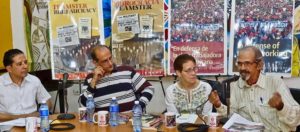 Roger Calero: Immigrant, Radical and Worker
Roger Calero: Immigrant, Radical and Worker
From the perspective of a worker living in the United States, I learned to admire the Cuban cause much more…
By DUNIA TORRES GONZÁLEZ
August 8, 2019
Translated and edited by Walter Lippmann for CubaNews

From the left: Róger Calero was recently in Havana, this time on behalf of Editorial Pathfinder, to present Farrell Dobbs’ Burocracia Teamster. (Photo: Jonathan Silberman/Militante).
Roger Calero was recently in Havana, in March 2019, at the Museo de los Trabajadores Palacio de los Torcedores, this time on behalf of Pathfinder Publishers to present Teamster Bureaucracy, by Farrell Dobbs (Missouri, 1907-California, 1983), and In Defense of the North American Working Class, by Mary-Alice Waters (1942), two publications that write about the labor movement in the United States. Calero is a union activist and correspondent for The Militant newspaper…
I was happy to know much more about his work, which made me admire the Cuban cause with greater fortitude. I remember the first time we met: Roger Calero and his compañeros, came to Santiago de Cuba to find out about the damage caused by Hurricane Sandy. He wanted to help. Later, in a room in San Carlos de la Cabaña, at the 2014 Havana International Book Fair, our first conversation began.
“I’m not that important,” he said, but he agreed to tell me about how he got involved in political activities. His story shows us that other face of the situation of immigrants in the United States, which has nothing to do with the “American dream”. He proudly repeated, “I’ve been a militant for 20 years”.
“Many families risk their children’s lives [trying] to reach ‘the promised land’. For the past 25 years, I have been living in the United States. I witnessed the early years of the Nicaraguan Revolution. I was very impressed. When I moved to the U.S., I learned about the real life of the workers. As a child, you can imagine what the movies convey, what is beautiful, everything in quotation marks… that fetishism of merchandise, that you have to have it, but reality immediately won out. When I started school I realized what the place of each social class was,” he said on that occasion.
From 1990 to 1991, the world witnessed a sad event: the Persian Gulf War, between Iraq and an international coalition of 34 nations led by the United States. His experience tells us: “At that moment thousands of workers showed their opposition. It was time for me to get involved in a conscious way in the political activities and that’s what I did.”
A few years later, in 1994, the California State government passed Proposition 187, a legislative proposal submitted for elections that denied undocumented immigrants social, medical, and public educational services. This was the background to many laws that were imposed by both the Bush and Obama administrations.
This situation provoked great mobilizations among immigrant workers: there were student strikes, work stoppages in which I had the opportunity to participate and help organize. That’s when I came into contact with the Socialist Workers Party (SWP).
His working life was no less intense. In 1999, when he moved to Minnesota, he had the opportunity to participate in the struggle for unionization in a slaughterhouse: “Between 500 and 600 cows a day were being slaughtered. The employers’ desire for enrichment increased the pace of work. The number of cows, then, was 800 a day. They were the same working days and the same staff, but with a significant change in production.
“This created extremely dangerous conditions for repetitive operations during the eight hours of work. Once again the answer was not long in coming. Among the workers who reacted were Latinos, Somalis, African-Americans… who joined together to organize a union. This fact was a little symbolic, typical of what is happening in the United States today,” he said.
“There is nothing that any Democrat or Republican politician says that can be believed regarding unemployment, working conditions and minimum wages, because the evidence shows the opposite. When you lose your job, the average amount of time between that day and the day you start your new job is 40 weeks. This puts us in a difficult situation because rents do not wait, health insurance does not wait, food does not wait. In a matter of a week or two, you could be losing your apartment.
He later told about the work of The Militant, a weekly newspaper of the People’s Party. They go to working-class neighborhoods, door-to-door, with astonishing results: “The workers are reading not only what is happening in the United States, but also the world. The crisis has been creating uncertainty; but at the same time, interest in our work. Two or three years ago, current readers would not have been interested in the issues we are defending today.”
From the left in the United States, they continue to be part of the class struggles, they did what they had to do in the battle for the liberation of Antonio, Ramón, René, Gerardo and Fernando: “On many occasions we have been blocked from entering the penitentiaries; but immediately we have received the response of the organizations defending constitutional rights, democratic rights and prisoners. This is how they try to limit the spaces that workers and trade unionists need to be able to organize…”.
On that day, Mary-Alice Waters reaffirmed Calero’s words, in the José Lezama Lima room, when she spoke about the work they do in U.S. prisons and support for solidarity campaigns with Cuba.
Calero proudly said some words that I still remember: “This is the story of many workers, but not as happy as mine, because now I know the objective of my struggle.”

You must be logged in to post a comment.